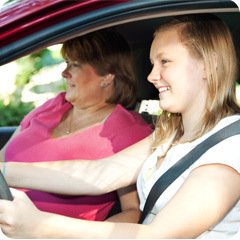 by Janet B. Brooks
by Janet B. Brooks
Child Advocacy Manager
Your daughter will soon be celebrating her 16th birthday and has never been more excited than she is right now. On the other hand, as a parent you are grateful that you have brought her safely through life this far. But suddenly, you are in a state of panic.
For most teens reaching driving age is a rite of passage, a long awaited milestone. Sitting behind the steering wheel of a car is perhaps the most anticipated event of adolescence. However, for mom and dad, the fear of injury to their child, possible property damage, and perhaps a reasonably sane relationship between them and their child accompanies this milestone. Talk about a dichotomy.
I remember my father trying to teach me how to drive a stick shift. We are lucky that we weren’t launched to the nearest planet with my lack of knowledge and coordination. After prying my hands from the steering wheel and recuperating from my clumsy clutch whiplash, I did recognize that my father loved me, had a reasonable amount of patience, and ultimately wanted me to succeed. He placed emphasis on my safety, and the safety of others in and out of the vehicle. We were even able to speak politely to each other during the process, and found ourselves laughing and stressing out about this adventure together.
I was reminded of these adventures when I learned that this year’s National Teen Driving Safety Week theme highlights the important roles for parents and teens in the learning-to-drive process. The message is that it takes two to develop a skilled safe driver. Communication is clearly an essential element. As teens and parents talk to each other and set clear expectations of each other, the responsibility to accomplish the task becomes a joint venture. Teens want support from their parents and devoted parent time to supervise practice drives. They also want parents to exhibit safe driving practices themselves. Parents want their teens to follow safety rules and be responsible behind the wheel. So, both teens and parents join together to successfully contribute to the exciting/frightening learning to drive experience.
Research shows that parents often misinterpret driving skill deficits in their teen as intentional risk-taking or not paying attention. So instead of teaching critical skills, parents may instead become irritated and let out an unrepeatable phrase. My dad would nearly put his foot through the floorboard pressing down on the imaginary brake. As parents and teens recognize that unsafe driving is often a result of unpracticed skills such as speed management and hazard detection they can overcome flaws behind the wheel.
I survived the whole learning to drive experience with few battle scars. So did my dad. I hope that you will too!
